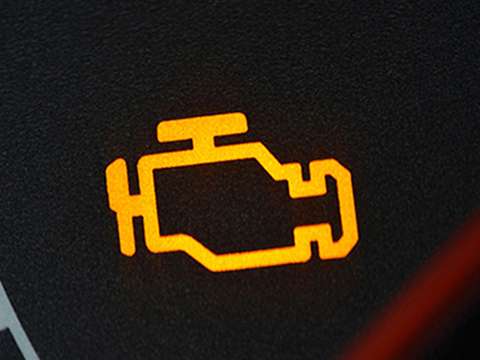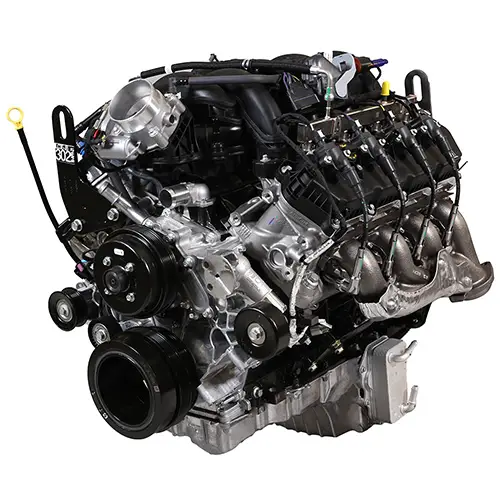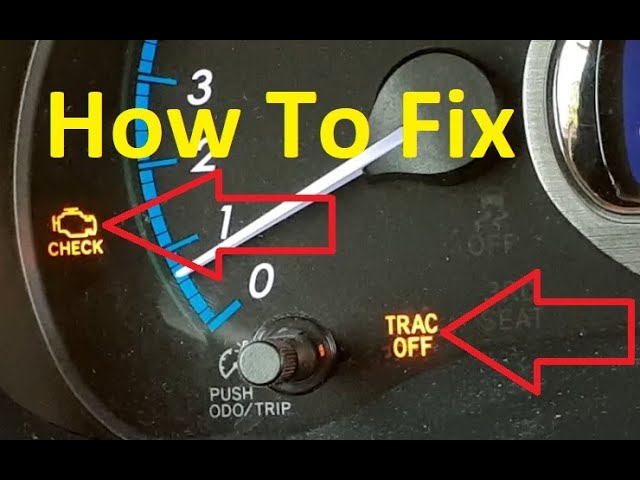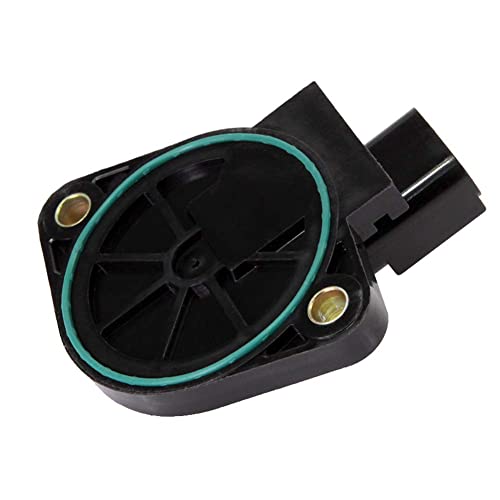Audi Check Engine Light: Troubleshooting Guide
The Check Engine Light in your Audi may be caused by various issues, including a malfunctioning fuel injection system, faulty head gasket, damaged oxygen sensor, or dirty mass airflow sensor, among others. It is important to address the underlying problem to ensure optimal performance and avoid further damage to your vehicle.
If you are unsure of the exact cause, it is advisable to consult a professional auto repair shop in your area for diagnostic and repair services. Do not ignore the Check Engine Light as it serves as an early warning system for potential issues with your Audi’s engine.
Common Causes Of Audi Check Engine Light
When it comes to the Audi check engine light, there are several common causes that drivers should be aware of. Identifying these causes can help you determine the best course of action to take when the dreaded check engine light illuminates on your dashboard. Below are three frequent culprits that can trigger the Audi check engine light:
Oxygen Sensor Failure
An oxygen sensor failure is one of the most common reasons for the Audi check engine light to come on. This sensor is responsible for measuring the unburned oxygen in the exhaust system of your Audi. When it fails, it can negatively impact your vehicle’s fuel efficiency and emissions. Promptly replacing a faulty oxygen sensor can restore your Audi’s performance and resolve the check engine light issue.
Faulty Fuel Injection System
A faulty fuel injection system can also trigger the Audi check engine light. This system plays a crucial role in delivering the right amount of fuel to the engine for efficient combustion. When the fuel injection system malfunctions, it can cause issues such as poor fuel economy, rough idling, and difficulty starting the engine. Repairing or replacing the faulty components of the fuel injection system is essential to resolve the check engine light problem and ensure smooth operation of your Audi.
Dirty Mass Airflow Sensor
The mass airflow sensor (MAF) measures the amount of air entering the engine and helps determine the appropriate amount of fuel to be injected. A dirty or contaminated MAF sensor can lead to inaccurate measurements, resulting in a variety of performance issues. These issues may include reduced power, rough running, and increased fuel consumption. Cleaning or replacing the dirty mass airflow sensor can help to eliminate the check engine light and restore optimal performance to your Audi.
If you notice your Audi’s check engine light is illuminated, it is essential to address the issue promptly. Ignoring the problem can lead to more severe damages and potential safety hazards. Consulting with a qualified mechanic or bringing your vehicle to an Audi service center can help diagnose the specific cause of the check engine light and provide effective solutions.
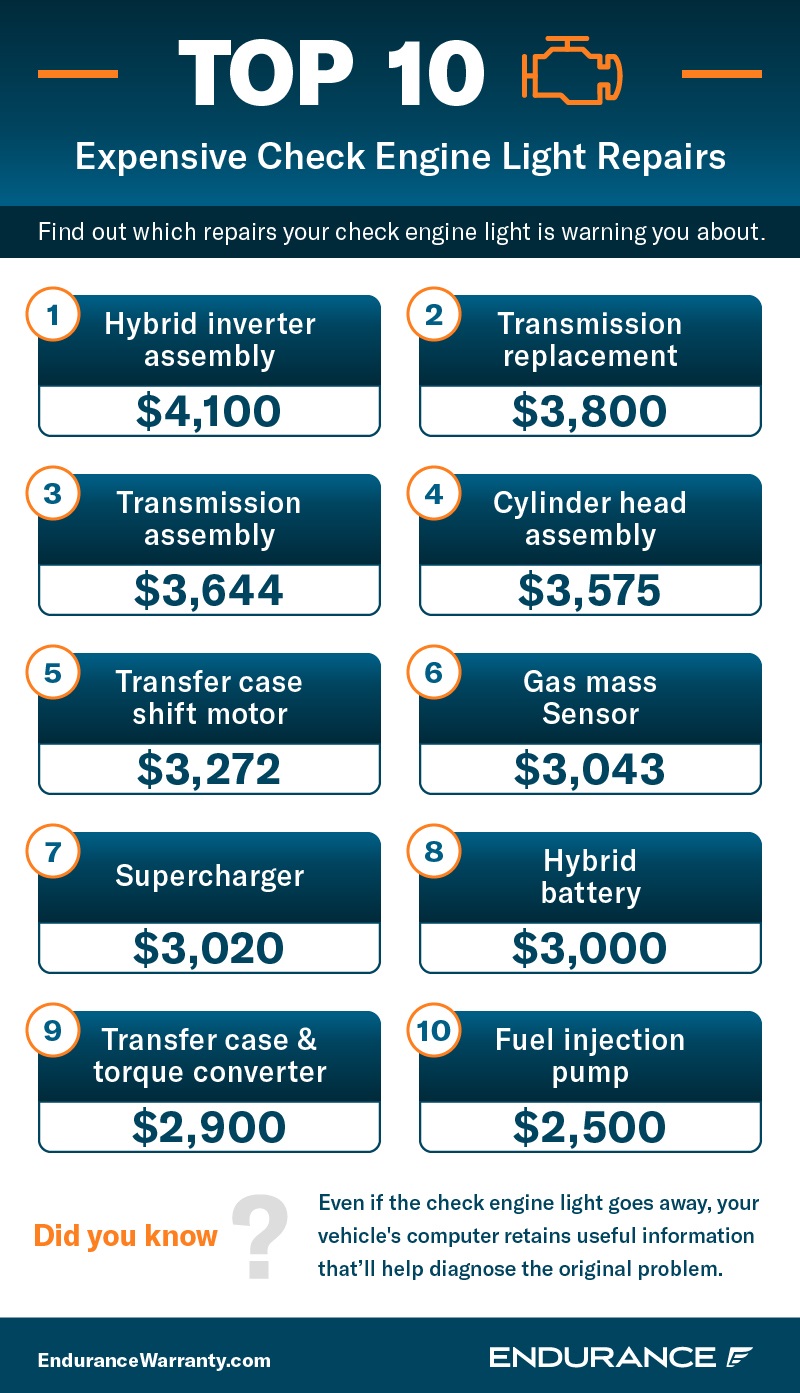
Credit: www.endurancewarranty.com
Troubleshooting The Audi Check Engine Light
The Audi Check Engine Light can indicate various issues, such as a malfunctioning fuel injection system, faulty head gasket, or damaged oxygen sensor. It’s important to address these problems promptly to ensure proper vehicle function. If the light persists, consulting a professional can help diagnose and resolve the underlying issues.
Scanning For Fault Codes
One of the first steps in troubleshooting an Audi check engine light is to scan for fault codes. This can be done using an OBD-II scanner, which can be easily purchased online or borrowed from your local auto parts store. The scanner will plug into the OBD-II port of your Audi, usually located under the dashboard on the driver’s side.
Once the scanner is connected, it will communicate with the onboard computer of your Audi and retrieve any stored fault codes. These codes are alphanumeric and provide specific information about the issue that triggered the check engine light. For example, a code like P0420 indicates a problem with the catalytic converter.
Clearing Engine Codes
After scanning for fault codes and identifying the issue, you may choose to clear the engine codes. Clearing the codes will turn off the check engine light, but it is important to note that it will not fix the underlying problem. Clearing the codes is a temporary solution and the check engine light will likely come back on if the issue is not resolved.
To clear the engine codes, you can use the OBD-II scanner. Simply select the option to clear codes or reset the system. It is recommended to consult the scanner’s user manual or refer to online resources for specific instructions on how to clear the codes for your particular make and model of Audi.
Check Gas Cap
In some cases, a loose or faulty gas cap can trigger the check engine light in an Audi. To rule out this possibility, make sure the gas cap is properly tightened after refueling. A loose gas cap can cause a pressure imbalance in the fuel system, leading the onboard computer to detect a potential issue and illuminate the check engine light.
If tightening the gas cap does not resolve the issue, it is advisable to inspect the cap for any signs of damage or wear. In some instances, a damaged gas cap may need to be replaced to prevent future issues.
Checking Emissions Control Parts
As the check engine light can also be triggered by faulty emissions control parts, it is important to inspect these components for any signs of damage or malfunction. Start by visually inspecting the engine bay and looking for any disconnected or damaged hoses, wires, or sensors related to emissions control.
If anything appears out of the ordinary, it is recommended to consult a qualified mechanic or automotive technician for a more comprehensive inspection. They have the expertise and specialized equipment to diagnose and repair any issues with the emissions control system in your Audi.
Effects Of Ignoring The Check Engine Light
Ignoring the check engine light on your Audi can lead to serious consequences. Common causes for the check engine light include issues with the fuel injection system, faulty emissions control parts, and damaged oxygen sensors. Promptly addressing these problems can help prevent further damage and costly repairs.
Potential Damage To Vehicle
Ignoring the check engine light in your Audi can lead to potential damage to various components of the vehicle. The light serves as an early warning system to alert you to potential problems, and by ignoring it, you may risk exacerbating existing issues.
Decreased Fuel Efficiency
Continuing to drive your Audi with the check engine light on can result in decreased fuel efficiency. This is because the engine may not be operating at its optimum efficiency, leading to higher fuel consumption and increased costs over time.
Risk Of Emissions Violation
Continuing to drive with the check engine light on may put you at risk of an emissions violation, as the light often indicates problems related to emissions control. Ignoring the light could lead to increased emissions and potential legal implications.

Credit: www.bertogdenautooutlet.com
Resetting The Check Engine Light
In case your Audi’s check engine light comes on, it is important to address the issue promptly to ensure optimal performance. One common solution is to reset the check engine light, which can be done following a simple process.
Step-by-step Guide
- Identify the issue triggering the check engine light.
- Access the OBD-II port in your Audi with a diagnostic scanner tool.
- Scan for fault codes to pinpoint the exact problem.
- Clear the fault codes to reset the check engine light.
- Ensure the issue is resolved before resetting the light.
Importance Of Regular Maintenance
- Regular maintenance helps prevent check engine light triggers.
- Timely inspections can catch potential issues early on.
- Maintaining your Audi’s health ensures longevity and performance.
Conclusion And Maintenance Tips
When the check engine light illuminates in your Audi, it’s crucial to address it promptly to avoid potential issues. Ignoring the warning could lead to more severe problems down the line.
Addressing Check Engine Light Promptly
- Don’t ignore the check engine light
- Visit a certified Audi technician for a diagnostic scan
- Address any identified issues promptly
Scheduled Audi Maintenance
Regular maintenance is key to keeping your Audi in peak condition and preventing check engine light issues. Follow the manufacturer’s recommended maintenance schedule to ensure optimal performance.
- Adhere to scheduled oil changes
- Replace air filters as recommended
- Check and maintain proper tire pressure
- Inspect the engine for any leaks or damage regularly
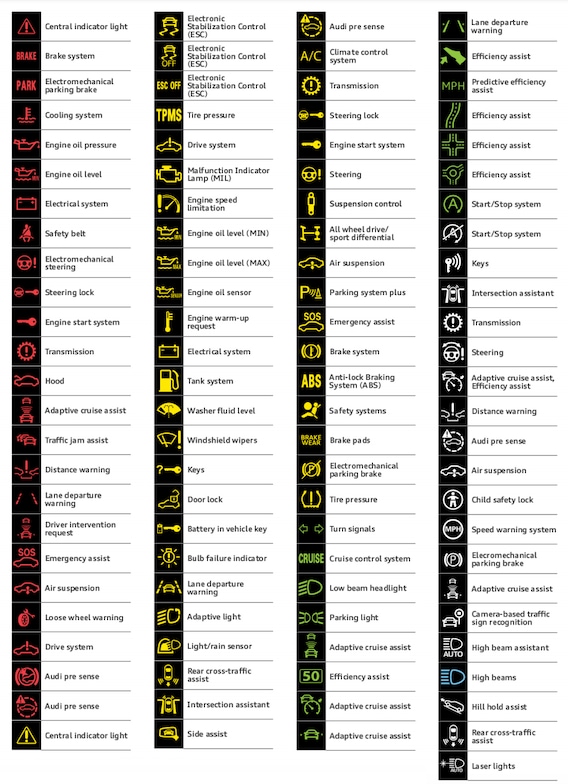
Credit: www.audiontario.com
Frequently Asked Questions For Audi Check Engine Light
Why Is My Check Engine Light On In My Audi?
The check engine light in your Audi can be on due to various reasons such as a malfunction in the fuel injection system, a faulty head gasket, damaged oxygen sensor, dirty mass airflow sensor, or defective spark plugs. Consulting a professional can help diagnose the exact issue.
What Is The Most Common Reason For Check Engine Light?
The most common reason for a check engine light is a failing oxygen sensor or a loose gas cap. Other common causes include problems with the fuel injection system, faulty head gasket, damaged catalytic converter, or defective spark plugs. Regular maintenance can prevent many of these issues.
How Long Can You Drive An Audi With Engine Light On?
You can drive an Audi with the engine light on for a short distance but should seek immediate service.
What Does Yellow Engine Light Mean Audi?
The yellow engine light in an Audi indicates various issues from minor sensor problems to major mechanical faults.
Conclusion
If your Audi’s check engine light is on, don’t panic. There can be various reasons for it, such as a faulty oxygen sensor or loose gas cap. It’s crucial to address the underlying issue promptly to prevent further damage. Consult a professional mechanic to diagnose and resolve the problem efficiently, ensuring the optimal performance of your Audi.

